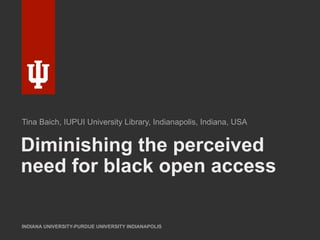
Tina Baich, IUPUI University Library, USA Diminishing the perceived need for black open access
- 1. Diminishing the perceived need for black open access INDIANA UNIVERSITY-PURDUE UNIVERSITY INDIANAPOLIS Tina Baich, IUPUI University Library, Indianapolis, Indiana, USA
- 2. OA = Open Access
- 3. Agenda • Overview of OA, including black OA • Discovery problems and new tools to uncover green and gold OA • Library action plan to combat black OA
- 5. What is open access literature? digital online free of charge free of most copyright and licensing restrictions Peter Suber
- 6. Self-Archiving § No peer review requirement § More than articles § Institutional or Subject § No cost to author Open Access Publishing § Peer reviewed articles § Publisher § Subsidized publishing costs
- 7. Hybrid Publishing • Mixes OA and subscription content in a single journal or within journal portfolio • OA journals with a traditionally subscription reliant publisher • Funded by Article Processing Charges (APC) charged to authors
- 8. Unauthorized Sharing, or black open access
- 9. 3 Levels of Black Open Access BlackOpenAccess Oblivious offender Phisher Hijacker Adapted from J. Herron (2017)
- 10. Oblivious offender Shares own work Likely does not intend to violate author agreements or copyright law
- 11. Phisher Requests or supplies someone else’s work Likely aware of copyright violation Not large scale
- 12. Hijacker Fulfills requests for someone else’s work Illegal aggregation of content Large scale
- 13. Discovery
- 16. Pushes the bounds of legal and ethical behavior
- 17. Open Access Button (OAB)
- 19. Unpaywall
- 21. INDIANA UNIVERSITY–PURDUE UNIVERSITY INDIANAPOLIS Impact of Unauthorized Sharing 1. Steers Traffic away from interlibrary loan and existing subscriptions 2. Leads to false impression of user wants and needs 3. Increases difficulty of justifying library funding if services and materials are not being used 4. Increases subscription costs 5. Results in suspension of access
- 23. INDIANA UNIVERSITY–PURDUE UNIVERSITY INDIANAPOLIS Discovery and delivery 1. Integrate OA discovery more fully into existing library discovery systems. 2. Integrate library resource discovery more fully in the web spaces where our users live.
- 24. Library catalogs Interlibrary loan systems Link resolvers and more?
- 25. Meet users where they are “Linked Data is about using the Web to connect related data that wasn't previously linked, or using the Web to lower the barriers to linking data currently linked using other methods.”
- 26. Meet users where they are RAMP (Remixing Archival Metadata Project)
- 27. Meet users where they are Wikidata and Google Knowledge Graphs https://twitter.com/Google/status/909863097103536129/
- 29. Collection strategies ”Just in Case” versus “Just in Time” Invest money, not just time, in open access
- 30. INDIANA UNIVERSITY–PURDUE UNIVERSITY INDIANAPOLIS Users must understand 1. why they should not engage in unauthorized sharing 2. why open access is an important information policy issue 3. how to use library systems effectively
- 31. Educating users • Adjust the frame • Case study method • Pair philosophical with practical • ILL communications
- 32. INDIANA UNIVERSITY–PURDUE UNIVERSITY INDIANAPOLIS
- 34. INDIANA UNIVERSITY–PURDUE UNIVERSITY INDIANAPOLIS Reference (in order of appearance) 1. Suber P (2004) Very brief introduction to open access. Available at: http://www.earlham.edu/~peters/fos/brief.htm (accessed 8 August 2017). 2. Björk B-C (2017) Gold, green, and black open access. Learned Publishing. epub ahead of print 13 January 2017: 1-3. DOI: 10.1002/leap.1096. 3. Herron J (2017) Predatory journals: What you need to know. In: Academic Libraries of Indiana Annual Meeting, 5 May 2017. 4. Howard J (2013) Posting your latest article? You might have to take it down. In: Wired Campus. Available at: http://www.chronicle.com/blogs/wiredcampus/posting-your-latest-article-you-might-have- to-take-it-down/48865 (accessed 22 August 2017). 5. Gardner C and Gardner G (2015) Bypassing interlibrary loan via Twitter: an exploration of #icanhazpdf requests. In: ACRL Conference Proceedings. Available at: http://eprints.rclis.org/24847/ (Accessed 31 May 2016). 6. Swab M and Romme K (2016) Scholarly sharing via Twitter: #icanhazpdf requests for health sciences literature. Journal of the Canadian Health Libraries Association 37(1): 6-11. DOI: 10.5596/c16-009.
- 35. INDIANA UNIVERSITY–PURDUE UNIVERSITY INDIANAPOLIS References (in order of appearance) 7. Liu J (2013) Interactions: the numbers behind #ICanHazPDF. In: Altmetric. Available at: https://www.altmetric.com/blog/interactions-the-numbers-behind-icanhazpdf/ (accessed 23 August 2017). 8. Bohannon J (2016b April 28) Who's downloading pirated papers? Everyone. Science Magazine. DOI: 10.1126/science.aaf5664. 9. Himmelstein DS, Romero AR, McLaughlin SR, Tzovaras BG and Greene CS (2017) Sci-Hub provides access to nearly all scholarly literature (No. e3100v1). PeerJ Preprints. DOI: 10.7287/peerj.preprints.3100v1. 10. Hoy MB (2017) Sci-Hub: what librarians should know and do about article piracy. Medical Reference Services Quarterly 36(1): 73-78. DOI: 10.1080/02763869.2017.1259918. 11. De Rosa C, Cantrell J, Carlson M, Gallagher P, Hawk J and Sturtz C (2010) Perceptions of Libraries, 2010: Context and Community. Report.OCLC, Dublin, OH. Available at: https://www.oclc.org/en-US/reports/2010perceptions.html (accessed 12 May 2014).
- 36. INDIANA UNIVERSITY–PURDUE UNIVERSITY INDIANAPOLIS References (in order of appearance) 12. Kroll S and Forsman R (2010) A slice of research life: information support for research in the United States. Report, OCLC, Dublin, OH. Available at: http://www.oclc.org/content/dam/research/publications/library/2010/2010-15.pdf (accessed 12 May 2014). 13. openaccessbutton.org and unpaywall.org 15. Lewis DW (2016a) Reimagining the Academic Library. Lanham, MD: Rowman & Littlefield. 16. Lewis DW (2017) The 2.5% commitment. Avaliable at: http://hdl.handle.net/1805/14063 (accessed 11 September 2017). 17. Crissinger S (2017) Access to research and Sci-Hub: creating opportunities for campus conversations on open access and ethics. College & Research Libraries News 78: 86– 95. DOI: 10.5860/crln.78.2.9621. 18. BTAA Discovery to Delivery Project Action Committee (2016, November 17) A vision for next generation resource delivery. Report. Available at: https://www.btaa.org/docs/default-source/library/attachment-8- btaad2dactioncommitteereportdraft.pdf?sfvrsn=0 (accessed 30 August 2017).
- 37. INDIANA UNIVERSITY–PURDUE UNIVERSITY INDIANAPOLIS Photo credits 1. "Which Way" by oatsy40 is licensed under CC BY 2.0 2. “Just in Case…” by Todd Lappin is licensed under CC BY-NC 2.0 3. “Framed” by Les Chatfield is licensed under CC BY 2.0 4. “Relentless Optimism” by steve_l is licensed under CC BY-NC 2.0
